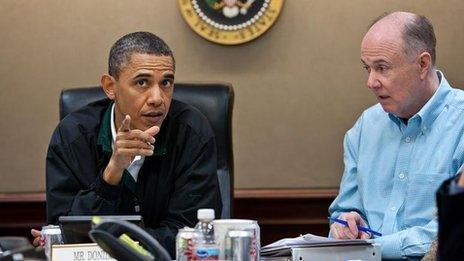Is Obama's drone doctrine counter-productive?
- Published
- comments

White House officials say President Obama takes the final decision for every drone strike himself
US President Barack Obama personally approves every single drone strike against suspected terrorists, so he can take full moral responsibility for the deaths these cause.
That is the main thrust of a long, detailed and fascinating piece, external in the New York Times.
It comes as experts have been telling me that the president is wrong to see drones as a "silver bullet" that solves some critical problems about the morality and efficacy of America's use of military power.
The New York Times paints a picture of a regular, 100-strong video conference meeting that decides the names, external to be put on a "kill list": the next suspected terrorists to be targeted.
It quotes the president's national security adviser, external, Tom Donilon: "He is determined that he will make these decisions about how far and wide these operations will go… he's determined to keep the tether pretty short."
White House spokesman Jay Carney says he will not discuss specific details of decision-making.
The article confirms that the care taken by the president is significant and he takes "extraordinary measures" to avoid civilian casualties.
Obama's drone doctrine
In reality, I cannot believe that as many officials spoke as freely as they apparently did without being given the presidential green light.
At a time when Republicans want to paint Mr Obama as a ditherer, external, unwilling to take firm action, it paints him as tough and strong, willing to take hard decisions and kill America's enemies.
But this goes beyond political spin. It is a doctrine of warfare.
We have known for a while that drones are the president's weapon of choice.
He believes that they kill America's enemies with minimum risk to the innocent and are a "light foot-print" compared to the heavy boot of invasion and occupation. The Obama administration is becoming more and more frank about the useof these unmanned planes.
Some are appalled.
There are plenty of blogs which say that drone attacks are murder, external, plain and simple. Others argue, external that they are illegal under international law.
But some say they simply do not have the desired result. Gregory Johnsen of Princeton University, external is an expert on Yemen and he told me that the rain of drone attacks has strengthened the hand of terrorists there.
"Look at Yemen on Christmas Day 2009, the day the so-called underwear bomber attempted to bring down a flight over Detroit.
"On that day al-Qaeda numbered about 200 to 300 individuals and they controlled no territory. Now today, two-and-a-half years later, despite all the drone strikes al-Qaeda in the Arabian Peninsula has tripled in size, it's now around 1,000 members and it controls significant territory.
"The more the US bombs, the more they grow."
No 'silver bullet'
He says drones strikes have killed women and children and al-Qaeda are adept at using this to recruit people for revenge.
Someone else who questions the light foot-print theory is David Rhode, external. He speaks form very personal experience. While a New York Times reporter, he was held hostage in the tribal areas of Pakistan by the Taliban. He recalled to me one attack.
"There was one drone strike close to the house where we were being held. It was so close that shrapnel and mud showered down into the courtyard.
"Just the force and size of the explosion amazed me. It comes with no warning and tremendous force."
He says that is not a light foot-print.
"They are a constant presence, you hear them circling over head the whole time.
"It's terrifying for everyone on the ground because they can hear it, like a small plane. What is so unsettling is you have no idea when this missile is going to come and kill you. There's a sense that your sovereignty is being violated.
"… It's a serious military action. It is not this light precise pin prick that many Americans believe."
Gregory Johnson says politicians can become mesmerised by this one tactic.
"The problem with drones is there is almost a seduction of simple solutions going on here. It is like a 'silver bullet', a magic missile solution to al-Qaeda in the Arabian Peninsula and I think that's very dangerous.
"What needs to happen is that the US has to do the very hard policy of diplomacy, or intelligence on the ground. The United States has a huge tool box at its disposal in Yemen and it is only using one of these tools."
I suspect the sci-fi allure of bringing retribution from the skies, with no risk to any American lives, will out-weigh such considerations.
The president may think very carefully before he approves individual killings, but in the end, as a strategy, drone attacks have too many attractions compared to doing nothing or sending in the troops.